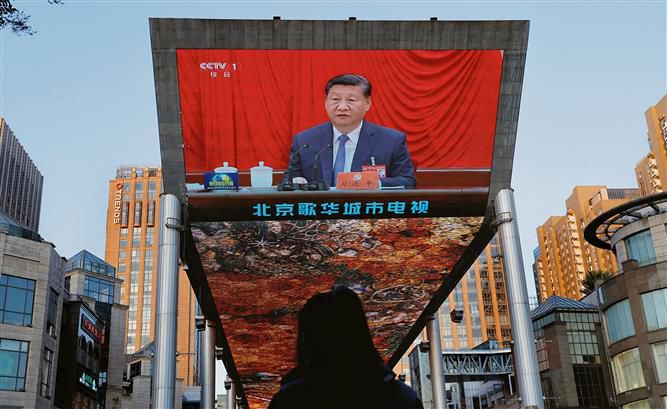China in for a shift in economic policy to incorporate Xi’s ideas
THE Central Committee (CC) of the Chinese Communist Party (CCP) convened its Third Plenum last week after an unexplained inordinate delay. The delay in holding the plenum despite China’s steadily declining economy — over 24 per cent graduate unemployment, high urban and rural unemployment, rising prices and cost of living, drastically reduced revenues of the provinces and widespread dissatisfaction resulting in strikes and protests — suggests that the CCP leadership was divided on the prescription required for giving the economy the necessary fillip.
The closed-door plenum (July 15-18) ended with the release of a 5,020-character (Chinese) communique titled ‘Decision of the Central Committee of the Communist Party of China on Further Comprehensively Deepening Reforms and Promoting Chinese-style Modernisation’. It bore the definitive imprint of President Xi Jinping. Underscoring this, it stated that Xi had delivered an ‘important’ speech explaining the decision on further “comprehensively deepening reforms and promoting Chinese-style modernisation.” The plenum, attended by 199 members of the CCP CC and 165 alternate members, ‘unanimously’ praised the Politburo and CC for guiding the country “in the face of a severe and complex international environment and arduous and onerous domestic reform, development and stability tasks.”
The communique clearly revealed that China’s leadership is worried about the current state of the country’s economy. Leaving the door open for future policy interventions, it said: “The plenum analysed the current situation and tasks and emphasised that (we must) unswervingly realise the annual economic and social development goals.” It offered no special incentives to the engines of China’s economy, namely its private entrepreneurs. In May 2023, China’s authoritative official news agency Xinhua had said: “The private sector contributes approximately 50 per cent of China’s tax revenue, 60 per cent of its GDP and 70 per cent of its technological innovation and accounts for 80 per cent of its urban employment.” Instead, the plenum appeared to continue favouring China’s State-owned Enterprises and said: “We must unswervingly consolidate and develop the public economy ….”
The plenum communique pointed to a definite shift in the economic policy to incorporate Xi’s ideas. It emphasised that plans had been made for “building a high-standard socialist market economy” and “promoting high-quality economic development.” It said “high-quality development is the primary task of building a modern socialist country in an all-round way.” It laid emphasis on ‘new industrialisation’, developing the ‘digital economy’ and ‘new energy’.
Hinting that China would strive to co-opt foreign partners for getting advanced technology, it said the country “must remain committed to the basic state policy of opening to the outside world and continue to promote reform through opening up” and “(we must) improve the mechanisms for ensuring national security in foreign-related affairs.” It advocated innovation and also referred to Xi’s signature Belt and Road Initiative.
A separate paragraph dwelt on ideology and the role of the CCP’s leadership. It stressed that the “party’s leadership is the fundamental guarantee for further deepening reform comprehensively to advance Chinese modernisation.” It particularly called for a deeper “understanding of the decisive significance of establishing Comrade Xi’s core position in the party Central Committee and in the party as a whole and establishing the guiding role of the Xi Jinping Thought on Socialism with Chinese Characteristics for a New Era.” Party cadres were exhorted to unite with the Central Committee, follow the leadership core and uphold Xi’s core position on the Party Central Committee.
Seeking to project confidence that China will be able to weather the difficulties caused by the imposition of sanctions by the US and West, especially on technology, the communique announced two important declarations. It declared that “by 2035, a high-level socialist market economic system” and ‘socialist modernisation’ will lay “a solid foundation for building a socialist modern power in an all-round way by the middle of this century.” It added that reform measures proposed at the plenum would be completed by 2029 — the 80th anniversary of the founding of the People’s Republic of China.
Of popular interest was the plenum’s pronouncement on the fate of senior CCP and People’s Liberation Army (PLA) officials who have disappeared from public view since mid-2023. The communique clarified that the CCP CC had accepted the request of former Foreign Minister Qin Gang, a protégé of Xi who appears to still retain his ‘protection’, that he be allowed to resign from the CCP CC. Confirming that he remains in the CCP, it referred to him as ‘Comrade’. Notable was the omission of references to Agriculture Minister Tang Renjian, who continues to be in the CC, and the former Defence Minister, Gen Wei Fenghe. Another Xi appointee, he is reportedly under investigation. Former Defence Minister Li Shangfu was charged with “serious violations of discipline and law” and expelled from the CCP. Interestingly, Li Shangfu and Xi were friends, and their fathers had served together in the People’s Army. The expulsions from the CCP of a former Rocket Force Commander, Gen Li Yuchao, and Chief of Staff of the Rocket Force Sun Jinming were confirmed. Three alternate members of the CCP CC were elevated as full members.
The plenum communique clearly bore Xi’s imprint, confirming his authority on economic affairs. It affirmed Xi’s concept of making China an advanced hi-technology country and emphasis on party discipline and ideology. It reiterated Xi’s goal of making China a “socialist modern power in an all-round way by the middle of this century.”
The communique, however, listed no incentives to address crucial issues of slowing growth, unemployment, etc. and boost the economy. China’s private entrepreneurs, who are major contributors to the country’s economy, as well as students, urban and rural unemployed, and others will be disappointed.









